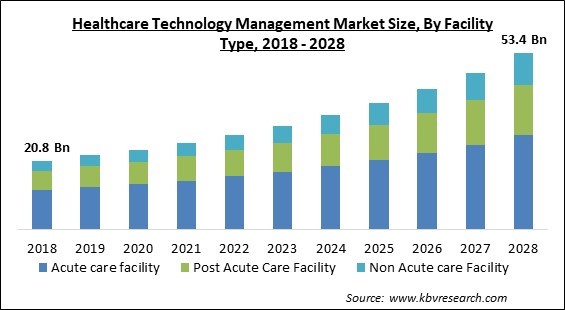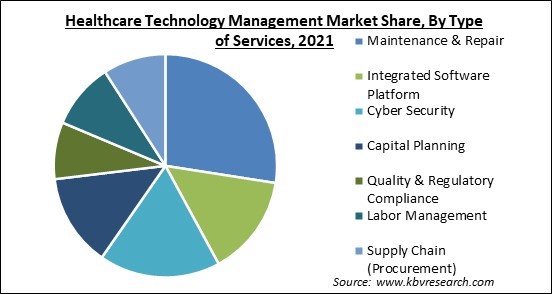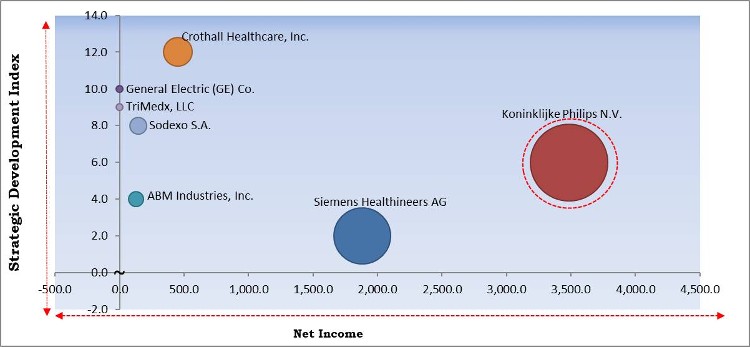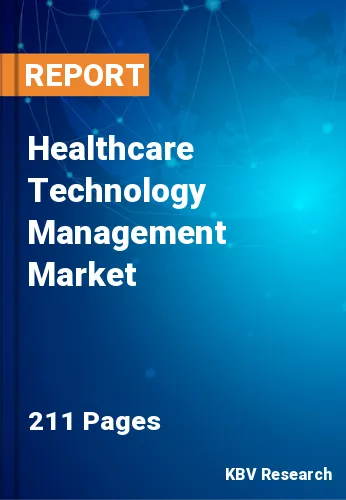The Global Healthcare Technology Management Market size is expected to reach $53.4 billion by 2028, rising at a market growth of 10.9% CAGR during the forecast period.
Healthcare technology management (HTM) is the sector in charge of overseeing the procurement, administration, and safe use of all medical and healthcare technology. Engineers and technicians that work in hospitals help with the procurement, repair and maintenance of health technology are known as HTM professionals. They are completely integrated components of the public healthcare team and have great influence over the hospital's health technology management. Medical equipment is rarely developed or manufactured by HTM personnel.
Technology is an integral element of today's healthcare system, and the individuals who keep it running are crucial. Working with the medical workers to determine the correct, secure, and optimum use of electronic devices, is able to bridge the gap between technologies and patient care. Medical equipment, such as monitors, dialysis units, nerve stimulators, imaging systems, infusion pumps, and heart-lung bypass devices, would require applying knowledge of device mechanics, hydraulic systems, pneumatic cylinders, and networking.
Technology is highly important in today's connected society, both in business and in personal life. Healthcare technology is unquestionably one of the most important areas in which technology plays a significant role. Healthcare practitioners and organizations are depended on developing technologies to improve and save countless lives across the world. The reliance on health technology in the healthcare business is growing, and as a result of healthcare's latest innovations, practitioners can continue to improve their profession, from better diagnosis to better patient care.

The coronavirus pandemic has put a huge pressure on the healthcare and life sciences industries' ability to function. The COVID-19 crisis has centred on the healthcare industry. These developments are already being recognised by the industry's forward-thinking players, developing tech-enabled solutions to meet them. Health management is expected to become increasingly integrated in the future, with diverse service providers collaborating to provide customers with the care they require. Several services are likely to migrate to a virtual environment or consumers' homes, with a platform connecting them.
As healthcare organizations strive to improve patient safety and care quality, the focus on regular maintenance of hospital devices has evolved. This entails a meticulously planned program in which maintenance activities are completed regularly to avoid larger and more expensive repairs down the road. People can communicate with health experts in various ways due to telemedicine and patient portals. Wearable technology, such as heart monitors, allows clinicians more means to assess their patients' well-being and gives them more alternatives for recording and evaluating symptoms as they go about their daily lives.
Medical errors are a growing source of public concern since they occur frequently and are an unavoidable element of human performance. Medical errors in hospitals and healthcare facilities are the third biggest cause of death in the United States, according to official Starfield and the American Institute of Medicine (IOM). Thankfully, technological advancements have facilitated the creation of systems that have been shown to minimize medical mistakes and save more lives. Patients and their caretakers are undoubtedly the most important resource for healthcare workers in improving patient safety since they have a strong personal commitment in it.
Data maintained by different vendors is not as protected as data housed on-premise, which is a big worry with cloud solutions. Patient information is considered sensitive, and a greater standard of privacy must be maintained so that only authorised people have access to it. Patient information has come under the scrutiny of regulatory frameworks in a number of nations, including the US's Health Insurance Portability and Accountability Act (HIPAA). Additionally, the EU has a number of data protection directives. Patients' Protected Health Information (PHI) cannot be transported out of their home nation in several countries. Personal information gathered, used, or disclosed in Canada is protected by the Personal Information Protection and Electronic Documents Act (PIPEDA).

Based on Type of Services, the market is segmented into Maintenance & Repair, Integrated Software Platform, Cyber Security, Capital Planning, Quality & Regulatory Compliance, Labor Management, and Supply Chain (Procurement). An integration platform is a piece of software that connects many applications and services. It sets itself apart from enterprise application integration, which is primarily concerned with supply chain management. It creates an atmosphere for engineers by employing the concept of system integration to work smoothly on the healthcare pieces of equipment and technologies.
Based on Facility Type, the market is segmented into Acute care facility, Post-Acute Care Facility, and Non-Acute care Facility. Acute care is a type of secondary health care in which a patient receives active but brief therapy for a serious accident or disease, an immediate medical condition, or during surgery recovery. Practitioners strive to integrate this care into a patient's daily routine as much as possible. Long-term care is frequently provided in a group home, nursing home, or an individual's home. For immediate, urgent treatment, acute care is frequently provided in a hospital or doctor's office.
| Report Attribute | Details |
|---|---|
| Market size value in 2021 | USD 26.2 Billion |
| Market size forecast in 2028 | USD 53.3 Billion |
| Base Year | 2021 |
| Historical Period | 2018 to 2020 |
| Forecast Period | 2022 to 2028 |
| Revenue Growth Rate | CAGR of 10.9% from 2022 to 2028 |
| Number of Pages | 211 |
| Number of Tables | 303 |
| Report coverage | Market Trends, Revenue Estimation and Forecast, Segmentation Analysis, Regional and Country Breakdown, Competitive Landscape, Companies Strategic Developments, Company Profiling |
| Segments covered | Type of Services, Facility Type, Region |
| Country scope | US, Canada, Mexico, Germany, UK, France, Russia, Spain, Italy, China, Japan, India, South Korea, Singapore, Malaysia, Brazil, Argentina, UAE, Saudi Arabia, South Africa, Nigeria |
| Growth Drivers |
|
| Restraints |
|
Based on Regions, the market is segmented into North America, Europe, Asia Pacific, and Latin America, Middle East & Africa. For the procurement of medical devices and equipment, Canadian healthcare organizations use a variety of competitive tendering processes. For information on buying choices offered in each province, U.S. suppliers interested in exporting to Canada should visit the individual provinces' tendering websites. More than 80% of medical device companies are located in Québec and Ontario, with buyers ranging from private to public health facilities.
Free Valuable Insights: Global Healthcare Technology Management Market size to reach USD 53.3 Billion by 2028

The major strategies followed by the market participants are Partnerships. Based on the Analysis presented in the Cardinal matrix; Koninklijke Philips N.V. is the major forerunner in the Healthcare Technology Management Market. Companies such as Crothall Healthcare, Inc., General Electric (GE) Co. and TriMedx, LLC are some of the key innovators in the Market.
The market research report covers the analysis of key stake holders of the market. Key companies profiled in the report include General Electric (GE) Co., ABM Industries, Inc., Siemens Healthineers AG, Koninklijke Philips N.V., Sodexo S.A., Crothall Healthcare, Inc., TriMedx, LLC, Agility, Inc., Renovo Solutions, and JANNX Medical Systems, Inc.
By Type of Services
By Facility Type
By Geography
The healthcare technology management market size is projected to reach USD 53.4 billion by 2028.
Medical errors now are gradually reduced are increasing are driving the market in coming years, however, concerns about data privacy and security are rapidly growing growth of the market.
General Electric (GE) Co., ABM Industries, Inc., Siemens Healthineers AG, Koninklijke Philips N.V., Sodexo S.A., Crothall Healthcare, Inc., TriMedx, LLC, Agility, Inc., Renovo Solutions, and JANNX Medical Systems, Inc.
The Maintenance & Repair segment acquired maximum revenue share in the Global Healthcare Technology Management Market by Type of Services in 2021, thereby, achieving a market value of $13.1 billion by 2028.
The North America market dominated the Global Healthcare Technology Management Market by Region in 2021, and would continue to be a dominant market till 2028; thereby, achieving a market value of $18.9 billion by 2028.
Our team of dedicated experts can provide you with attractive expansion opportunities for your business.

